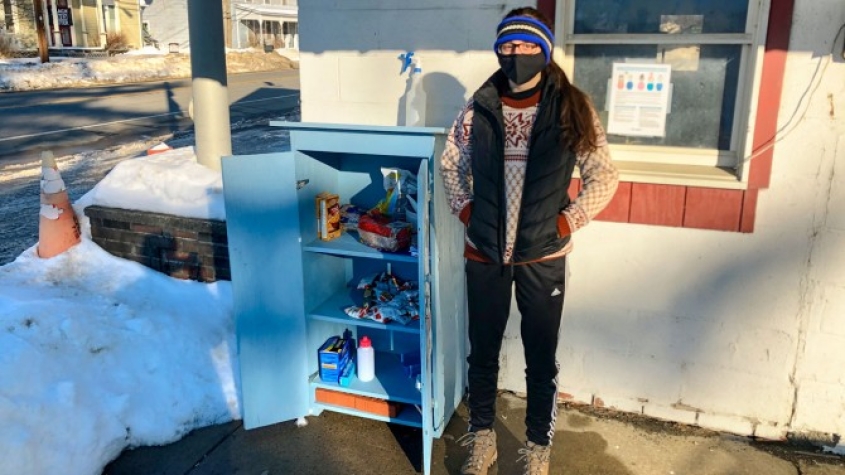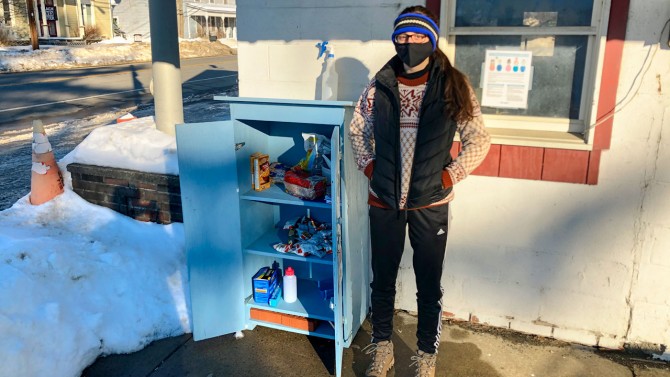MPH receives research grant to support Ithaca-area communities
Note: This news item features content from another page. View the featured content for this news item.
Cornell faculty and students are teaming up with community partners in Tompkins County to address opioid use, increase food security, build a greener construction industry and share stories of Ithaca’s Black history pioneers.
The four teams received Engaged Research Grants, totaling more than $192,000, from the Office of Engagement Initiatives (OEI) to involve undergraduate students in the community-engaged learning projects.
Through Understanding and Supporting Communities within Communities, four students will connect with Black people who use opioids. Jerel Ezell, assistant professor in Africana Studies and team lead, calls the project a “multilayered community partnership, student-to-neighborhood cultural exchange.”
“USCWC is an opportunity to bring the Cornell research community into commune with some of Ithaca’s underserved and hidden populations, in a way that creates equitable, productive and fruitful relationships for both student-researchers and study participants,” Ezell said.
Provided
Brianna Johnson ’21, a student researcher on a Cornell team working to increase food security for local residents.
The project team, which includes staff from Southside Community Center and REACH Project, Inc., will conduct surveys, oral histories and interviews with hundreds of people who use drugs to better understand their backgrounds, drug use behavior, and medical and social needs.
Students will also interview social services workers, treatment providers and law enforcement officers about their experiences with this marginalized population. Based on the research findings, the team will create resources for people who use drugs and for members of the general public who want to support the community; launch a social media campaign to fight the stigmatization of drug users; and influence future policy and program development in Tompkins County.
In a letter expressing support for the project, Nia Nunn, president of the board at Southside, said she is excited about the team’s approach to “get ‘upstream’ of the complex social and economic risk factors that contribute to opioid use and drug injection in our communities, by amplifying our population’s existing strengths when it comes to community-building and resilience.”
In another project, Enhancing Mutual Aid Food Sharing during a Pandemic, faculty and students are partnering with Mutual Aid Tompkins (MAT) to increase food security for local residents. Based on the philosophy of “neighbors supporting neighbors” to meet survival needs and strengthen community, MAT began placing outdoor food-sharing cabinets throughout Tompkins County and the surrounding area in spring 2020. Today, there are more than 50 food cabinets stocked with food and other essentials.
The Cornell research team is led by Karla Hanson, senior lecturer in the Master of Public Health (MPH) Program. In January, three undergraduates and one MPH student began taking and analyzing photographs to understand and improve the flow of food into and out of the cabinets, and to assess the barriers people face when it comes to using the food-sharing cabinets.
“At Cornell, I have explored community resilience, food insecurity and mutual aid through my coursework, but this project has given me the opportunity to engage firsthand with these themes and witness the incredible successes, as well as the ongoing opportunities, of an inspiring organization like MAT,” said Brianna Johnson ’21, a student researcher on the team.
Other projects that received Engaged Research Grants are:
- CI:RCLE (Circular Ithaca: Researching Construction in the Local Economy): a team investigating how to eliminate waste from building design, construction and operations. Led by Felix Heisel, assistant professor of architecture, and Mark Milstein, clinical professor in the Samuel Curtis Johnson Graduate School of Management, students will collaborate with experts from across the materials cycle – from architecture and construction to recycling and reuse – to analyze how resources move through the system and where more sustainable methods can be used.
- Trap Door: an original “headphone walking play” based on Ithaca’s histories of the Underground Railroad and civil rights eras. Under the guidance of Lyrae Van Clief-Stefanon, associate professor of literature in English, students are researching and writing texts for the project. The play, which will debut in May, is a collaboration with The Cherry Arts and the History Center in Tompkins County.
“Research is such a rich way for students to get involved in community-engaged learning,” said Amanda Wittman, associate director for community-engaged curriculum and strategy in OEI. “They’re able to see how community partners can direct the flow of the research process, respond to real-world concerns and build scholarly research skills.”
Ashlee McGandy is the content strategist in the Office of Engagement Initiatives.







